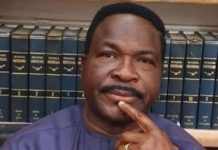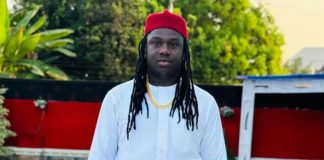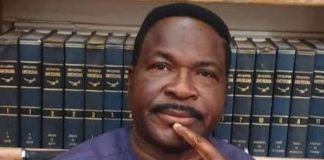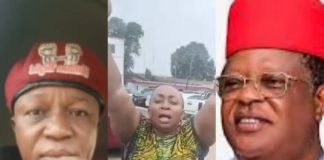🌿 Ruzu Non-Alcoholic Herbal Bitters
Ruzu Non-Alcoholic Herbal Bitters is a natural health supplement specially formulated to:
- ✅ Promote general wellness
- ✅ Detoxify the body
- ✅ Support the treatment of various ailments
Made from a powerful blend of 100% organic and medicinal herbs, Ruzu is completely alcohol-free, making it ideal for:
- 👪 All age groups
- 🌱 Health-conscious individuals
- 🌿 Anyone seeking non-alcoholic herbal remedies
Whether you're looking to boost your vitality, cleanse your system, or support healing the natural way, Ruzu Bitters offers a trusted herbal solution.
LIFE engages teenage youths in a 3-day workshop to enlighten and educate on effective GBV response and access to justice
By Onome Naomi
In a bid to curb the increasing Gender Based Violence’ in the Nigerian environment, Leadership Initiative for Youth Empowerment (LIFE) organised a 3-day workshop with the theme “Scaling up leadership of female survivors for effective gender-based violence (GBV) response and access to justice in Oshodi-Isolo local government” from Tuesday, April 9th–11th, 2024, in Lagos.
The seminar had over 41 teenage boys and girls in attendance from various local government areas in Lagos State to mingle and interact while learning the act of denormalizing things that are believed to be normal. In addition, the youths were sensitised to task themselves with the mandated reporting of abuse cases to relevant agencies, irrespective of a victim’s disposition.
The workshop for day 2 commenced with discussions from the previous session (day 1) to ascertain the learning and assimilation level of attendees who are teenage participants. This mental drill is meant to spur participants to realise the diverse abusive cases that could be averted or resolved if approached using the proper channels, bearing in mind that “Survivors utmost cooperation defines the outcome of a case in prospective.”
Barr. Gloria from the Lagos State Office of the Public Defendant (OPD), who facilitated the day-2 workshop session, enlightened the teenage attendees on the various kinds of abuses, which include physical abuse, sexual abuse, verbal abuse, exploitation, restraint of freedom, intimidation, emotional and psychological abuse, etc. She noted that ignorance of the law is not an excuse for certain behaviours termed abusive and says survivors must not condone abuses due to certain factors considered to be propelled abnormalities perceived as a normal way of life when in reality it is an abuse.
In her message to the teenage youths, she said, “Be a change agent by normalising the abnormal actions that are seen as normal.” There are protection laws for domestic violence cases that aid access to justice and also channel the mental state of survivors towards recovery from ordeals.
Barr. Gloria further enumerated the various laws and their applications to access justice for victims. To mention a few, she said:
“The protection law against violence was enacted in 2017. Sometimes people go through violence unaware that it is an abnormal act, nor do they know there is a law protecting them. It is important to educate children at the early stages of life. In Lagos State, everybody under the age of 18 is a child.”
“Again, there is a thin line between discipline and abuse; any discipline that leaves a mark on the body of a child is no longer discipline but abuse. Lagos State has a protection system in place for every child.”
“There are lots of children in correctional centres who have entangled themselves in a sexual abuse offense. Also, an underage person cannot give consent to sex.”
“If a spouse or individual suffers domestic violence, he or she is entitled to file for a restriction called a ‘Protection Order’ barring any form of contact with the abuser or report to agencies that can help file for a restriction order, which is subject to withdrawal if the survivor is willing to close the case against the perpetrator. Meaning, if someone receives a protection order, the protected can apply for restrictions to be removed due to good behaviour and acceptance; however, the court will ensure that the protected is not coaxed into withdrawing but voluntarily making such a request. Protection orders are 70% guaranteed if requested, and OPD and other relevant agencies, including LIFE, can provide support systems for the aftermath of GBV cases.”
“Witnesses should realise that they are mandatory reporters to report unusual activities that seem to be against the law. Filing an application in court involves an affidavit that states the facts about why you need lawful protection. It is paramount to report any form of abuse, as you can never tell the end result of an abusive act until it is fully carried out, which can lead to regret on the part of the witness.”
“Abuses can be transgenerational if they are not addressed. It’s a cycle that should be cut short; otherwise, they attract the wrath of the law. Be conscious of abuses; be the change we see. Obstruction of justice is the act of not putting the law into practice; there is a need to activate the law to get justice.”

In participation, some of the teenage youths asked pertinent questions arising from their immediate environment in GBV cases, while Barr. Gloria gave responses by giving extensive insights on matters of concern.

David Ral, a second facilitator for the day-2 session of the workshop, talked about self-esteem and peer pressure. He enumerated how appreciating one’s self promotes the quality of one’s lifestyle and how low self-esteem can affect the quality of one’s lifestyle. He educated the teenage attendees on several levels of low self-esteem and how to adapt to issues arising, sensitising them on ways to change their mindset from low to high self-esteem.
He further said:
“To move your mindset from low to high self-esteem, you need to change the way you think and develop self-awareness (a conscious awareness of one’s own character).”
Read Also:N30bn Recovered from Betta Edu, 50 Bank Accounts Under Probe – EFCC
David also mentioned the factors that affect self-esteem, they are: social experience, peer influence, changes during stages of growth in life, etc. He also expanded on ‘How to Improve Self-Image’ by ways of challenging negative thoughts and replacing them with positive, realistic thoughts, the practice of self-compassion, engaging in self-reflection, building supportive relationships, and having positive affirmations. In addition, he entertained questions from the teenage youths.




















